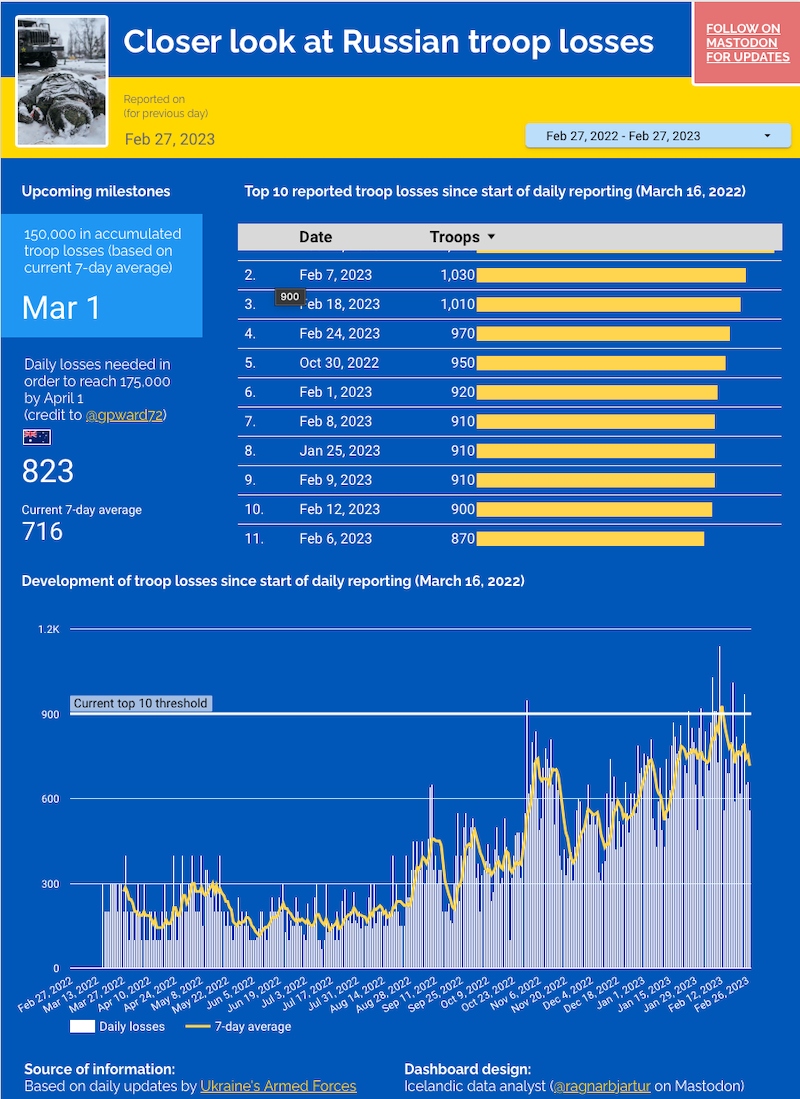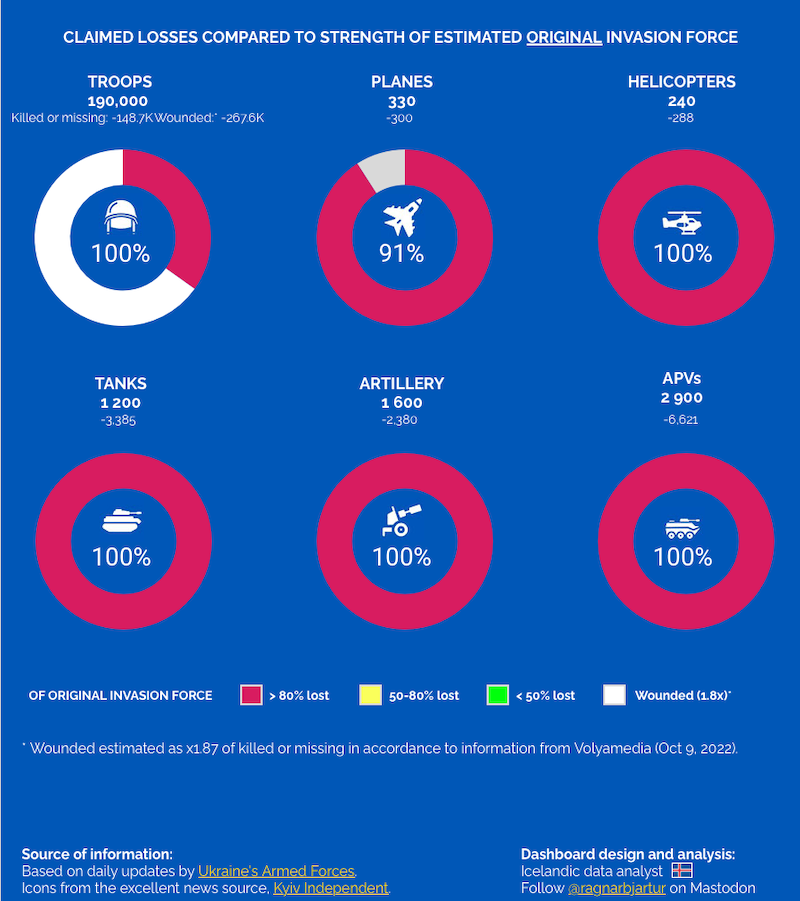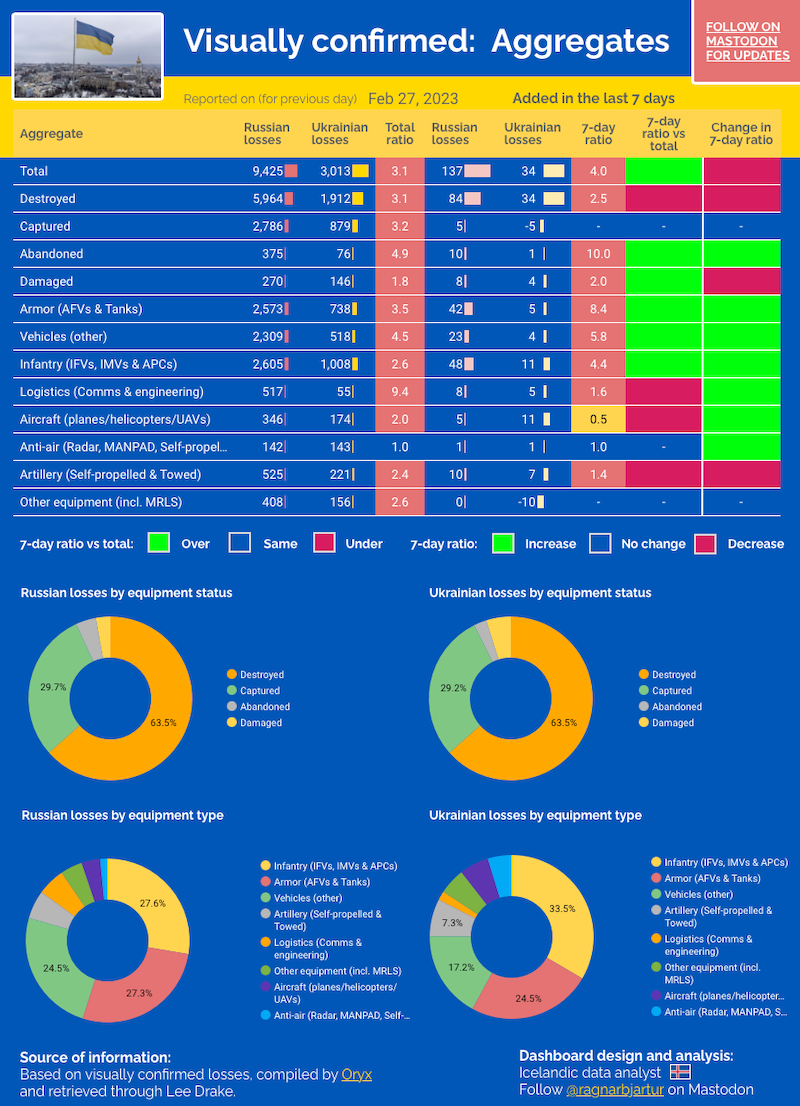The Ukraine war thread
-
https://www.aljazeera.com/news/2023/2/21/qa-dr-pavel-felgenhauer-russia-ukraine-war
Some of the comments:
=-=-=-=-=-=-=-=Al Jazeera spoke to Pavel Felgenhauer, a Russian defence analyst who served as a senior research officer in the Soviet Academy of Sciences.
Al Jazeera: Why do you think an escalation is imminent?
Pavel Felgenhauer: We cannot totally predict everything. But I believe that an escalation right now is imminent. An escalation in the fighting; everyone is talking about a Russian offensive. Western military commanders in Brussels are also talking about how the Ukrainians should go on the offensive.
Al Jazeera: Isn’t Russia faring better than expected? Doesn’t the economy seem to be stable even after strict sanctions?
Felgenhauer: Russia, of course right now, has very serious financial problems with a deficit that’s being financed by printing money. It has problems on the battlefield at the same time.
I don’t see how this can continue in the present pattern for a long time. It’s like football, you never know what’s going to happen actually on the battlefield. There’s a well-known saying that “Russia is never a strong as your fear”, as we see during this year, but “Russia is also never as weak as you hope”. So you can’t just write off Russia. The intensity of the fighting is too high for it to be maintained for long.
Al Jazeera: If it is such a drag, why did Russian President Vladimir Putin go to war?
Felgenhauer: There was a military reason — to prevent Western missiles appearing in Ukraine for a direct strike on Moscow.
There was a geopolitical reason — to reunite the Russian people, assuming that Ukrainians are Russian people, and to defy the West and actually undermine Western unity.
Also, to cause friction within the Western alliance and also establish a new multipolar world.
Al Jazeera: So what went wrong for Russia?
Felgenhauer: The Russian military turned out to be not as strong as not only the West believes, but its own leadership believes. It’s not ready for modern warfare.
The Ukrainians are much better, they were better prepared organisationally and in terms of command and control, in terms of command personnel, and then they got better weapons than the Russians.
The Russian military has been isolated for more than 100 years from world tendencies in war-making. They are still living in the world of tanks, believing that if you mass enough, victory falls into your lap.
Al Jazeera: Do you believe that this conflict will come to its end soon?
Felgenhauer: I believe it will end this year.
They tried talks in March, then meetings in Istanbul, which hinted that they’re moving towards some kind of an agreement. But Russia and Ukraine were miles apart.
Ukraine was more or less ready to agree in February 2022. Now Ukrainians say they want more and Russia also says it wants more. So again, two sides are miles apart.
-
Problematic polarization between Russia and Ukraine notwithstanding, it’s a hopeful assessment.
-
My concern is what does Putin do if and when his conventional forces are exhausted and no victory in sight.
-
Only had time to listen to half of it. He was talking about that when I had to leave. He made great points about it being a war of attrition and that we are not ramping up production. A mistake in my book.
-
I wager that all NATO members will soon have no choice other than to ramp up their military production and allocate fiscal resources into defence and security.
Will be a hard pill for the federal and even provincial governments in this country to have to swallow.
-
I wager that all NATO members will soon have no choice other than to ramp up their military production and allocate fiscal resources into defence and security.
Will be a hard pill for the federal and even provincial governments in this country to have to swallow.
@Renauda said in The Ukraine war thread:
I wager that all NATO members will soon have no choice other than to ramp up their military production and allocate fiscal resources into defence and security.
Will be a hard pill for the federal and even provincial governments in this country to have to swallow.
God, I hope they will.
-
Constitutionally in this country guns are a federal responsibility and butter is a provincial responsibility. I see no problem provided both are willing to cut duplication and waste.
I wish it were as simple in practice as the constitution defines it.
-
-
The story:
There has been quite the buzz this Sunday on social media about a supposed attack on a Russian A-50 Mainstay airborne early warning and control aircraft that is forward deployed to Machulishchy Air Base south of Minsk, in Belarus. We cannot confirm that this attack actually happened or the nature of the damage, if any, to the A-50 — the type has been a staple at the base throughout the war. But if it did occur, it would be a significant loss for the Russian Air Force and, depending on how it was carried out, it could be a sign of a developing front and what's to come in the now year-old war.
The image seen at the top of this article was taken on February 19th. It shows the A-50 in its usual spot at the Belarusian air base. Various claims state that the aircraft, a variant of the Il-76 quad-jet cargo transport, was attacked via drone and damaged if not destroyed. There are also claims that this was done by a partisan group inside Belarus, which would be a significant development if true.The target here is very important, regardless. The A-50s are very low-density, high-demand assets and are one of Russia's major advantages over Ukraine in terms of the air war. The A-50 provides general wide-area aerial surveillance and airborne command and control capabilities. Beyond this, and arguably most importantly, they provide the critical 'look-down' radar surveillance capability for Russia's air operations. As such, not only can they generate an 'air picture' deep into Ukraine, but this also includes detecting low-flying aircraft which far-off ground-based radars cannot see. This is the currently primary operating regime for Ukrainian aircraft anywhere near Russia's 'overlay' of complex anti-air capabilities that extends deep into Ukrainian-controlled territory.
-
The story:
There has been quite the buzz this Sunday on social media about a supposed attack on a Russian A-50 Mainstay airborne early warning and control aircraft that is forward deployed to Machulishchy Air Base south of Minsk, in Belarus. We cannot confirm that this attack actually happened or the nature of the damage, if any, to the A-50 — the type has been a staple at the base throughout the war. But if it did occur, it would be a significant loss for the Russian Air Force and, depending on how it was carried out, it could be a sign of a developing front and what's to come in the now year-old war.
The image seen at the top of this article was taken on February 19th. It shows the A-50 in its usual spot at the Belarusian air base. Various claims state that the aircraft, a variant of the Il-76 quad-jet cargo transport, was attacked via drone and damaged if not destroyed. There are also claims that this was done by a partisan group inside Belarus, which would be a significant development if true.The target here is very important, regardless. The A-50s are very low-density, high-demand assets and are one of Russia's major advantages over Ukraine in terms of the air war. The A-50 provides general wide-area aerial surveillance and airborne command and control capabilities. Beyond this, and arguably most importantly, they provide the critical 'look-down' radar surveillance capability for Russia's air operations. As such, not only can they generate an 'air picture' deep into Ukraine, but this also includes detecting low-flying aircraft which far-off ground-based radars cannot see. This is the currently primary operating regime for Ukrainian aircraft anywhere near Russia's 'overlay' of complex anti-air capabilities that extends deep into Ukrainian-controlled territory.


